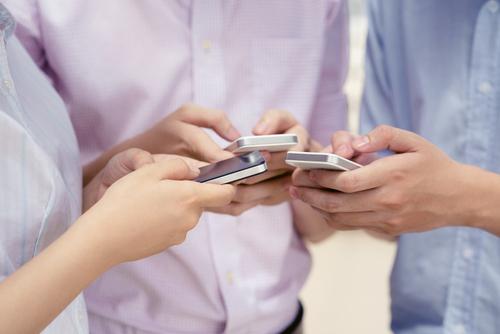Are You Addicted to Your Smartphone? Read These 12 Sentences to Find Out

It’s hard to imagine life without smartphones. For many Americans, it’s the first thing they see after waking and the last thing they check before falling asleep.
Sixty-eight percent of adult Americans sleep with their cellphones next to their beds. A majority text or talk while driving. A Harris Interactive poll shows that a third check their phones during movies.
Twenty percent do this during church. Nearly 10 percent have admitted
to checking their phones during intimate moments. Some take selfies with
the dearly departed at funerals. And a new trend of taking a selfie
while on the toilet, aka the “poopie,” has emerged.
So is there such a thing as cellphone addiction?
Yes.
Cellphone
addiction is in the same family as other technology addictions, such as
computers and gaming, which are all part of a larger family of
behavioral addictions (to gambling, exercise, sex, etc.). Anything that
can produce pleasure in your brain has the potential of becoming
addictive. Loss of control is the essential element of any addiction.
Research
has identified the “six signs” of any type of substance or behavioral
addiction. Those six signs – salience, mood modification, tolerance,
withdrawal, conflict, and relapse – apply to cellphone addiction as
well.
Are you addicted?
Let’s see.
Read
the definitions of each of the six signs below and then agree or
disagree with the following statements. By the time you’ve completed
this task, you will have a better idea of whether you’ve reached your
tipping point when it comes to your cellphone use.
*
Salience
A behavior becomes salient when it is deeply integrated into your daily routine.
1. The first thing I reach for after waking in the morning is my cellphone.
2. I would turn around and go back home on the way to work if I had left my cellphone at home.
Euphoria
Who
knows what the beep, buzz, whistle, or stylized ringtone might have in
store for you? The feeling of anticipation or excitement that precedes
and/or follows the use of your cellphone is a mood modification that can
result in euphoria.
3. I often use my cellphone when I am bored.
4. I have pretended to take calls to avoid awkward social situations.
Tolerance
As
in the case of drug and alcohol abuse, tolerance addresses the need for
an ever-increasing “dose” of the behavior to achieve the desired
“high.”
5. I find myself spending more and more time on my cellphone.
6. I spend more time than I should on my cellphone.
Withdrawal symptoms
The
feelings of irritability, stress, anxiousness, desperation, and even
panic that often occur when you are separated from your cellphone are
good examples of withdrawal symptoms.
7. I become agitated or irritable when my cellphone is out of sight.
8. I have gone into a panic when I thought I had lost my cellphone.
Conflict
A
common outcome of cellphone addiction is conflict. Do your spouse or
children complain that you are always on your phone? Do you allow texts,
calls, and e-mails to spoil your vacations and personal time? Are your
work activities interrupted by playing games, visiting Facebook, and
countless other forms of entertainment offered on your cellphone?
9. I have argued with my spouse, friends, or family about my cellphone use.
10. I use my cellphone while driving my car.
No comments:
Post a Comment
Leave you comment here...